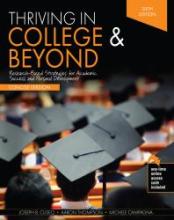Search Results: 11 - 20 of 6901
display
Policing for the 21st Century: Realizing the Vision of Police in a Free Society
Author(s): Christine Gardiner, Matthew J Hickman
Policing for the 21st Century: Realizing the Vision of Police in a Free Society provides a thematic overview of policing and its role in American society. This text is unique in that it provides extensive information about how police identify community problems, the methods police use to respond to ...about product
Service Management Principles for Hospitality and Tourism in the Age of Digital Technology
Author(s): Jay Kandampully, David Solnet, Anil Bilgihan
Service Management Principles for Hospitality & Tourism in the Age of Digital Technology was developed through many years of teaching service management mainly to hospitality and tourism management students. This edition ensures that the content of this book remains current and includes references a...Small Group Communication: Principles in Action
Author(s): Teresa M. Patterson, Cynthia Luna
The uncertainty of instructional delivery during the Covid-19 crisis has created new challenges for community college instructors. Many instructors have been forced to instantly shift from the brick and mortar classroom to a virtual online environment. In addition, many companies and organizations ...Global Enterprise: The Theory & Practice of International Business
By: Eugene Paul Kim, Roger Philips, Stanley Klatka, Jonathan Opata, Virginia A Suveiu, Robert Austin
about product
Global Enterprise: The Theory & Practice of International Business
Author(s): Eugene Paul Kim, Roger Philips, Stanley Klatka, Jonathan Opata, Virginia A Suveiu, Robert Austin
Global Enterprise – Theory and Practice is a multi-authored textbook on international business providing an alternative to the standard, bland, encyclopedic international business textbooks on the market today. The emphasis here is on teaching students usable skills and knowledge in the context of ...Communication Ethics Literacy: Dialogue and Difference
Author(s): Janie Fritz, Leeanne McManus, Michael Kearney
Communication ethics is imperative in the 21st century as the prevalence of conflicting opinions endangers successful, respectful communication. Utilizing a dialogic approach to ethical communication, Communication Ethics Literacy: Dialogue & Difference provides a timely review of classic communicat...Project Management for the Hospitality Industry
Author(s): Timothy Flohr, William Duncan, Catherine Curtis
Though Project Management consistently ranks as the one of the most sought-after certifications throughout multiple industries, many mistakenly think that Project Management is limited to the information technology, finance and insurance, manufacturing, and construction industries. Interestingly, th...Learning About Dance: Dance as an Art Form and Entertainment
Author(s): Nora Ambrosio
New Ninth Edition Now Available!Learning about Dance: Dance as an Art Form and Entertainment introduces students to the exciting, daring, ever-changing, and dynamic world of dance.Learning about Dance invites readers to experience the artistry and excitement of the dance world. The publication prese...Discovering Answers: Research Methods for Public Relations
Author(s): Donnalyn Pompper
Welcome to the strategic and creative world of research methods for addressing organizational problems and maximizing opportunities with clear goals and objectives—and evaluating strategic public relations campaigns and projects. Curiosity drives the public relations engine as we seek to discover as...about product
Thriving in College and Beyond: Research-Based Strategies for Academic Success and Personal Development: Concise Version
Author(s): Joseph B Cuseo, Aaron Thompson, Michele Campagna
Thriving in College & Beyond: Research-Based Strategies for Academic Success and Personal Development covers the full range of topics and issues that impact student success. Content is delivered through a variety of educational formats and learning modalities, including snapshot summaries, concept m...Improv(e) Business: Developing Skills for Personal and Professional Success
Author(s): Gary Shields, Rico Bruce Wade, Kari Goetz
Being able to improvise and adapt to changing environments is an important skill. So important, in fact, that most people improvise something in their lives every single day, given the complexity of our lives and the ubiquitous nature of change in modern society. Despite the frequency of improvising...






